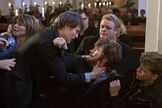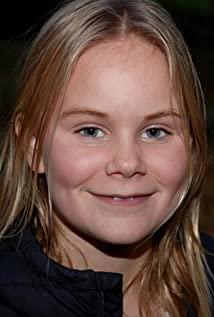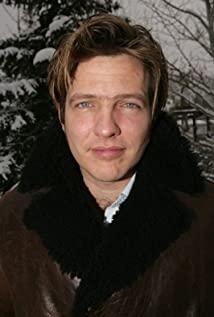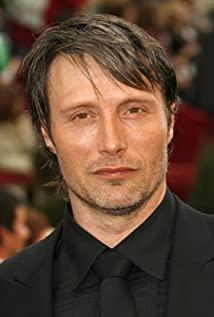1. Carla mentions "he (Lucas) did nothing" three times in the film.
the first time
Kara faced the big fat man invited by the principal. This interview was a key point in the fermenting of the whole incident.
Klara "I didn't say anything."
Fatty "So this is something Greta made up out of nowhere...or did you just make it up?"
Klara "No."
The way this fat man asked was very problematic from the very beginning. I don't think any child would be willing to admit that he lied. All Carla's answers were very hesitant, only this "no" blurted out. What she subconsciously denied was that she made a mistake and lied, not whether the content of the lie was fact.
fat man second try
"Tell me what Lucas did?"
Klara "Can I go play?"
Fat Man's third attempt, at which point he begins to make up some facts in the question for leading questions.
Fatty "Is Lucas here to show you his xx?"
After a long time (several shots), Kara finally nodded in silence.
At this time, the fat man's expression was content and determined, rather than shocked by this appalling thing or other similar emotions. This also confirms that from the very beginning he has finalized in his mind that Lucas is indeed a crime, and he has been prejudiced from the very beginning. Apart from the principal, as the second appraiser, Fatty's performance can be said to be extremely bad.
the second time
After Lucas was kicked out of the house by his bearded father, Carla witnessed everything and said in her mother's arms:
"He didn't do anything. I was just talking nonsense, that's all..."
The mother first flashed a hint of consternation, looked away for a while, and then came up with a reasonable theory to "brainwash" her daughter: Victims sometimes tend to forget some unpleasant memories.
Mom Klara "But it did happen. And we're glad you told us."
Here I understand a certain joy in a mother's heart for preventing her daughter from being hurt in time, but that joy requires an enemy. That's Lucas, a hypothetical "perfect abuser." Regardless of the truth of the matter, they desperately need such a character to satisfy their so-called sense of responsibility for protecting minors. The existence of the enemy proves their justice, but no one remembers who really cared about Kara's inner feelings before the enemy was created.
Some people may feel that the above statement is based on the perspective of the audience, and the characters have no way of grasping the overall truth, so as a mother, it is natural to prefer the bad. But in this episode, the incident is still under investigation, and Lucas can only be called a suspect. But he was treated as a real criminal, existing in people's imaginations to satisfy their joy that they thought they could stop the evil in time, such as that fantasy about the basement was speechless. The basement is the perfect crime scene, and Lucas has come to be imagined as the "perfect abuser".
the third time
After the church incident, Carla slept by the bed, and she even had hallucinations and saw Lucas and the dog Fanny. It can be seen that the whole thing has had a great impact on Kara uncontrollably, and I feel guilty. The bearded father understood at this time. Maybe he was thinking about what his daughter would do if the truth of this farce was revealed. That group of justice guards will instantly turn into clowns. Maybe all the blame will be pointed at her.
2. Kara's accusation
Children know far more than we think, and innocence is a weapon in their favor, even if they don't know it can be used effectively against adults. Cara's intimacy is not accepted and recognized by Lucas, which is distorted in her heart as love and self-esteem being "trampled" and "looked down". If Lucas could have calmed down and talked with Cara at that time, and had done his ideological work, maybe the ending would have been different. It's a pity that he was soon caught up in other trivial matters, leaving the little girl alone in her thoughts.
In fact, Carla's love is similar to Lolita's falling in love with the uncle in "This Killer Is Not Too Cold". I also grew up in a native family environment that lacked love and attention, and was even hurt by my siblings. When I meet such a warm-hearted person who listens to me carefully, and at the same time gives me a sufficient sense of security, it is possible to develop this kind of attachment. understand.
And I don't think she knew the power of Carla's angry words in the dark.
"I hate Lucas...he's stupid and ugly...he's got xx...hard as a stick...he gave me this but I don't want it."
Words like "hate", "stupid" and "ugly" that directly express emotions and express malice are in line with what Kara can say at her age. For children, this may be the first way they can think of how to put down a person.
And she said "he still has xx", which means that he has xx is one of his crimes, which is as annoying as stupid and ugly. She then added sensual adjectives like "hard", the deadliest of Lucas' charges. How could Carla know? Like ugly, stupid, and masculine, xxx hard is all she can think of to express annoying ways. Because her brother's friend had shown her xx pictures and vomited related foul words. This is the general disgust impression a little girl has on men, and is used here to describe Lucas, who accidentally "offended" this sensitive precocious girl.
3. Kara's family of origin
Although Carla's brother is not featured much in the film, he is an important figure. Apparently his failure to take care of his friends led to his sister being exposed to intuitive visual stimuli and foul language, which was a serious dereliction of duty as an older brother.
Before the accident, the family had sweet moments (husband and wife embraced each other), but also discord (the family quarreled and no one even took Kara to kindergarten; the elder brother did not want to take his younger sister to school, so he was taught by his mother).
When my mother and brother came to the kindergarten, the principal said that there was something to tell and asked my brother to go out. The elder brother didn't leave immediately, but stood in place until he was sent away with a rude pat from his mother. The elder brother was a little startled and then shook his head and went out.
Since it is assumed that the principal did not intend to tell his brother in person, and if the movie is only about how Kara's family knew about this matter, then it would be fine as long as the mother didn't show up? Why did the director "superfluous" to arrange for his brother to also appear?
I thought that through these intentional or unintentional small details, the director indirectly showed some subtle disharmony hidden in the Kara family. Although it is not exact, it is enough to make the audience feel that the family is not very concerned about the education and mental health of the children. And the reality is indeed the case. Between "stocking" children and "controlling" children, it seems that it is difficult for parents to find a suitable balance.
In addition, Carla's love for the dog Fanny also indirectly shows that no one in the family of origin can give her enough emotional response. One of the characteristics of animals, especially dogs, is loyalty, trust and obedience to their owners, which is why dogs always bring healing and comfort to humans. Apparently, at home, Carla's emotions are being neglected, and Lucas and the dog give her emotional nourishment at this time.
4. The role of Lucas
I have seen many film critics "complaining" that the early stage of the film is too long and the rhythm is slow. I would like to say that the occurrence of a terrible event is gradually fermented by a variety of factors, and these factors are hidden in various calm plots in the early stage, some of which have been mentioned above, and will not be repeated here.
But one thing I would like to point out in particular is that from start to finish, Lucas is a responsible and responsible person. Lucas escorted Carla twice, whether it was the first time he ran into Carla at the supermarket or the second time he passed by Carla's house and found her sitting on a bench by the side of the road, he first asked Carla himself if he would let him take him home/ I went to school, and after I got permission, I called Carla's parents. This behavior consists of two actions: obtaining the consent of the person and notifying the minor guardian. It seems simple, but it contains Lucas' respect for the child as an adult and his emphasis on communication.
Communication is the exchange of information. Lucas has always had a willingness to communicate. When talking on the phone with his ex-wife, he always kept calm and emphasized that "we need to communicate to solve the problem", but the tone of the ex-wife was very emotional, and finally even avoided the problem by hanging up the phone directly.
After the accident, in the face of his son's sudden visit, Lucas first hugged him in surprise, greeted him, and then said, "Does your mother know you are here?" Marcus answered Yes with a guilty conscience, he realized that his son might be lying. Later, Lucas once again mentioned in the conversation "your mother knows you are here right".
As with Kara's case, Lucas made sure the child's guardian was aware of the situation each time. At the same time, he not only showed the importance of communication by example, but also urged his son to call his mother. This life detail of dealing with people just proves that Lucas is a frank, responsible, thoughtful and open-minded person.
This kind of character creation formed a strong contrast with the accusations he received, and the director also asked: How could such a righteous person be slandered as a child abuse pervert? Why are things getting worse? Are rumors now wildly growing unchecked and out of touch with reality?
5. About the ending
If he really wanted to kill, he wouldn't hit the first shot, why wouldn't the second shot be made, and why wouldn't he run away if he didn't make up the gun?
After all, we have no way of knowing whether the gun was aimed at the male protagonist or the deer. As analyzed by many film critics, it doesn't matter who shot the last shot, it is a symbolic symbol left by the director on purpose. On the one hand, it implies that Lucas' situation is still in the hunt of various rumors, he never knows what people will think of him, and it is difficult for him to change the status quo. On the other hand, this shot is a symbol of the fearsomeness of people saying that an unjudgmental casual remark, an unprovoked conjecture, may actually injure someone by mistake. Especially in today's era full of various online public opinions, we have a greater right to speak and more channels to speak, which also means that we can hurt more people and have greater power.
View more about The Hunt reviews










